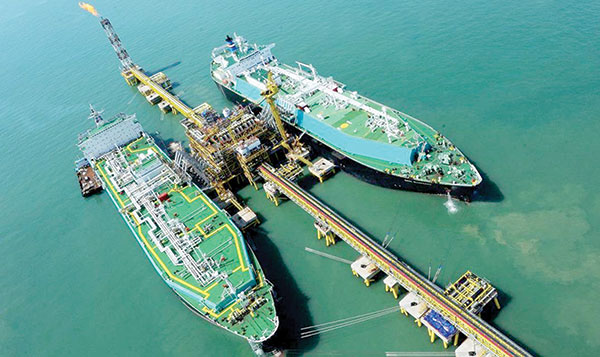Labuan to gain from LNG Ship Break Bulking
Published on: Thursday, October 17, 2019
By: David Thien

KOTA KINABALU: Labuan Port Authority Chairman Chan Foong Hin is optimistic of better times for Labuan’s economy once the tender for the port operation is settled later for the sake of better operational efficiency and new development like Petronas LNG Ship-to-Ship Break Bulking Solution operation off Labuan gains momentum in future.
In a presentation at the 2nd Sabah Port Forum recently, themed ‘Building the New Future – Unlocking Sabah’s Maritime Potential’ at the Magellan Sutera Harbour Resort and Spa Ballroom, Petronas explained in an overview power point brief that, “ship-to-ship (STS) transfer operation is the transfer of cargo between seagoing ships positioned alongside each other, either while stationary or underway.”
ADVERTISEMENT
“The delivering ship is called mother vessel. The receiving ship is called daughter vessel. Cargoes typically transferred via STS include oil, liquefied gas, bulk cargo and other products.”
“We have the competitive advantage to provide LNG STS solutions.”
The calmer Brunei Bay waters off Labuan is ideal for Ship-to-Ship Break Bulking Solution operation. Petronas LNG Ltd (PLL), had twice successfully conducted LNG break bulking ship-to-ship (STS) transfer, once in June 2018 and once this year.
According to Petronas, it’s a gazetted sheltered area with weather and sea condition within safe operational limits, a strategic location for Malaysia to boast of being well positioned to provide LNG STS solution. Other sites considered are Linggi waters off Malacca and around Johor Straits, all within the trading route of Japan, Korea, Taiwan and China – world’s largest LNG importers.
ADVERTISEMENT
With great promise to benefit Labuan, Malaysia’s national petroleum company - Petroliam Nasional Bhd (Petronas) boasts of being an integrated and reliable LNG player with more than 35 years of extensive experience in delivering energy security with its gas deposits off East Malaysia with accessibility to remote or smaller LNG terminals.
Labuan’s Asian Supply Base belonging to Sabah Energy Corporation offers storage facilities for STS equipment close to STS operation sites off shore. Then there are high performance tug and boat services as standby alternatives in case of failure or emergency with STS equipment transfer services for safe, efficient inspection and handling mobilisation and de-mobilisation.
ADVERTISEMENT
Hence, Labuan’s available infrastructure and technical capabilities with experience in handling several LNG STS operations is second to none.
Petronas Vice-President for LNG marketing and trading Ahmad Adly Alias said past successes in completing the STS was a collaborative effort with various stakeholders, namely Sabah Department of Ports and Harbours, Sabah Ports Authority, Sabah Ports Sdn Bhd, Argo Engineering Sdn Bhd, Eastport Marine Sdn Bhd, MISC Bhd, Asian Supply Base Sdn Bhd, Teekay LNG Partners L.P., Shenergy Group Co. Ltd, and Farenco Shipping Pte Ltd.
Adly Alias said Petronas is committed to support the emergence of new markets and non-traditional buyers.
“As the LNG market becomes more liquid and with the emergence of new markets and non-traditional buyers who face operational constraints at their terminals, we are committed to supporting the growth of these markets through providing innovative and flexible operational solutions such as LNG break bulk services via STS.”
Adly explained that today’s Asian buyers prefer to grow their LNG business gradually, by importing smaller parcels of LNG, moving away from the traditional mode of long-term supplies over a specific term.
“The second STS operation by Petronas demonstrates the company’s ability to respond to the changing landscape of LNG delivery and customers’ demand for customised solutions, at the same time supporting the growth of the LNG market in areas with limited operational parameters.”
To recap on the two successful Petronas LNG Ship-to-Ship Break Bulking Solution operation off Labuan, the first involved the LNG cargo from Malaysia LNG Sdn Bhd (MLNG), Bintulu was transferred from the ‘mother’ vessel, Seri Bijaksana to the ‘daughter’ vessel, SS Lucia Ambition, where the cargo from SS Lucia Ambition and remaining cargo in Seri Bijaksana will subsequently be delivered to respective buyers.
The second involved the fully loaded Seri Bijaksana vessel carrying LNG cargo from Gladstone LNG, Australia, transferring smaller parcels onto two ‘daughter’ vessels for onward deliveries to different LNG terminals in Shanghai, China. This truly demonstrated that ship sailed from Australia using the Makassar Straits, not the South China Sea, to Labuan waters for the STS.
The first cargo was transferred from the ‘mother’ vessel to an 80,000 m³ ‘daughter’ vessel, Arctic Spirit, while the second cargo transfer was done with another similar size ‘daughter’ vessel, Polar Spirit.
The back-to-back break bulking STS transfers via Arctic Spirit and Polar Spirit vessels were completed in approximately 72 hours, manifesting a just-in-time (JIT) principle, driving the operational cost to the minimum level.
Stay up-to-date by following Daily Express’s Telegram channel.
Daily Express Malaysia




